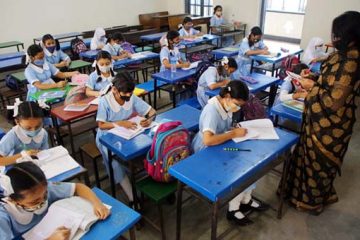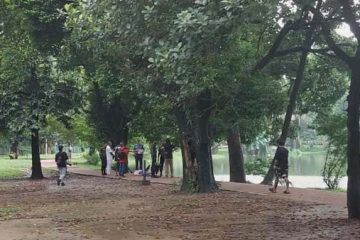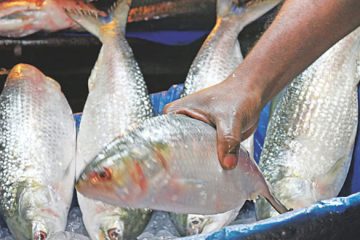Rubber slippers float on water, reddish partly from oil leaked from the truck or from blood of 42 children and 2 others who perished when it plunged into the ditch.
People still come and stand silent to give a vacant look at the site. Only ravaging anger and a sense of nothingness prevail.
For the Mirsarai people, nothing and nobody can stop their mourning. Nothing and nobody can bring back their lost children who are now in heaven and whom they brought up so dearly. Only tears flow. Only the thought of heaven.
Would you know my name if I saw you in heaven? Would you hold my hand if I saw you in heaven? The people think.
Beyond the door there will be peace, I am sure. And I know there will be no more tears in heaven. The mourners think. And yet mourning becomes only heavier. Tears turn to torrents.
“My brother, his blood made the water red,” sobbed Saraswati Das, 35-year-old sister of Liton Das, a class VIII student, who perished in Monday’s accident. She came to have a glimpse of the place where her brother’s short life ended.
She was not alone as the accident took lives from many families in the nearby four unions, mainly from Mayani union which saw deaths of its 28 boys as the speeding truck fell into the ditch. The other three affected unions are Moghadia, Khoyachhora, and Shairkhali.
Forty two of the dead were students from five educational institutions, their grade levels started from primary school. Abu Torab Bahumukhi High School alone lost 33 of its students.
Hundreds of students, teachers and guardians marched in mourning processions wearing black ribbons yesterday, as the upazila administration announced three days of mourning. All processions ended at the playground of Abu Torab Bahumukhi High School.
Education and industries ministers joined the mourning rally.
Those who did not turn up at the playground were too burdened with pain of loss to walk. Most of the shops remained closed as each hoisted a black flag in front.
“You won’t find a man who could hold his tears back,” said Kailash, a rickshaw puller, who refused to charge this correspondent for a ride, because he was working to report on the bereaved families.
He was controlling the rickshaw with one hand on the muddy village road, and with the other hand he was pointing out the houses that lost their boys.
Some women were also volunteering as guides for visitors. They were giving details of the deceased boys and their families.
Inside the houses mothers were speechless and losing consciousness repeatedly. Fathers were also not being able to stay strong. Relatives from distant villages kept coming in groups, only to raise the pitch of wailing.
Seventy-year-old Halima was crying sitting on the bank of the ditch of death. She had no choice but to witness the horrific accident, as she lives just across the ditch.
“The truck was on high speed when it tried to make room for a bhotbhoti coming from the opposite direction. The bhotbhoti was overtaking a CNG run autorickshaw,” she said.
She sighed as she remembered how the boys were shouting over the number of goals scored in the football match they were returning from.
The truck was carrying about 60 boys, mostly students of Abu Torab Bahumukhi High School. They were the audience of a football match in which Abu Torab Government Primary School lost the game to Moghadia Anjumannesa Primary School.
-With The Daily Star input




















